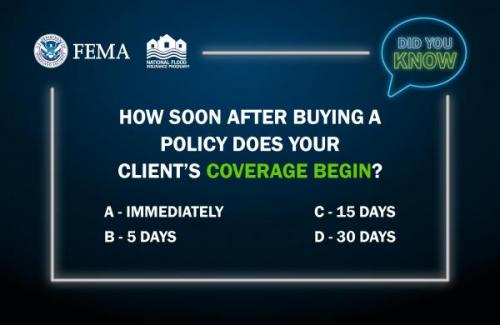Flood insurance is an important purchase to help safeguard homes and businesses. Other insurance policies typically don’t include flood protection–leaving your clients footing the bill in the event of a flood. Thankfully, the NFIP offers policies that help your clients protect the lives they’ve built.
One aspect of an NFIP flood insurance policy that policyholders need to know is the renewal is not automatic and in order to avoid a lapse and a 30-day waiting period, they need to renew their policies before they expire. It is critically important to discuss flood risk with your clients, so that you can help them through policy renewal well before rain clouds start to form.
Discussing Renewing your Clients’ Policies
When your clients’ policies are close to ending, talking to them about their renewal helps to ensure their home stays protected in the event of a flood. Follow these easy steps to guide them through a conversation about renewing their policy.
1 – Do An Insurance Checkup! Before they renew, talk to your clients to ensure they understand their current policy, what their deductible is, and ways they can save money and pay less for their flood insurance. Doing an insurance checkup is a simple and easy way of ensuring your clients have the coverage they need.
2 – Help Them Understand Their Risk! Invite your clients to talk about their flood risk carefully. The NFIP has plenty of resources to help visually depict your clients’ risk. When they understand their risk, they can make an informed decision about their insurance coverage. Everyone has a risk of flooding, everywhere it rains, it can flood.
3 – Discuss the 30-Day Wait Period! It's essential your clients understand the waiting period so that they can buy a policy and get protected as soon as possible. Since flood insurance doesn't take effect immediately, it's essential that your clients think of their future. Talk to them about the 30-day wait period and help them see a policy’s utility before they need it imminently. Waiting until the last minute can leave your clients exposed to significant repair costs.
4 – Don’t Let Their Coverage Lapse! Your clients’ policies do not automatically renew! Reminding them early and often, staying ahead of them maintaining insurance can save them money and save them from frustration if the policy lapses. Work with them before their coverage ends to ensure they have continuous coverage to protect their home.
The fact of the matter is that flood insurance helps people protect the lives they’ve built. Recovering after a flood can be difficult, and with flood insurance–your clients can rest assured, knowing they can bounce back more easily. Talk to your clients about their policies and ensure they renew before their coverage ends. Flooding can happen anywhere, at any time. Make sure your clients have all the information they need to make an informed decision—so they can stay flood insured.

